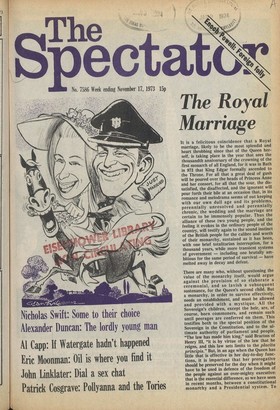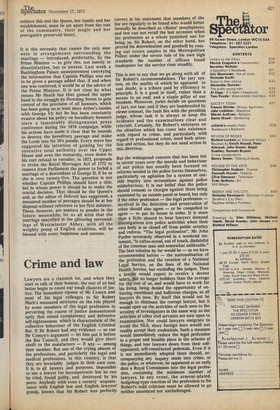The Royal Marriage
It is a felicitous coincidence that a Royal marriage, likely to be the most splendid and heart throbbing since that of the Queen herself, is taking place in the year that sees the thousandth anniversary of the crowning of the first monarch of all England, for it was in Bath in 973 that King Edgar formally ascended to the Throne. For all that a great deal of gush will be poured over the heads of Princess Anne and her consort, for all that the sour, the dissatisfied, the disaffected, and the ignorant will pour forth their bile at an occasion that, in its romance and melodrama seems of out keeping with our own dull age and its problems, perennially unresolved and perennially chronic, the wedding and the marriage are certain to be immensely popular. Thus the alliance of these two young people, and the feeling it evokes in the ordinary people of the country, will testify again to the sound instinct of the British people for the calibre and worth of their monarchy, sustained as it has been, with one brief totalitarian interruption, for a thousand years, while more transient systems of government — including one brutally ambitious for the same period of survival — have melted away in decay and defeat.
There are many who, without questioning the value of the monarchy itself, would argue against the provision of so elaborate a ceremonial, and so lavish a subsequent sustenance, for the Queen's second child. But a monarchy, in order to survive effectively, needs an establishment, and must be allowed and provided with a mystique. All the Sovereign's children, except the heir, are, of course, born commoners, and remain such until peerages are conferred on them. This testifies both to the special position of the Sovereign in the Constitution, and to the ultimate authority of parliament and people. "The law has made him king," said Bracton of Henry III, "it is by virtue of the law that he reigns, and this law sets limits to the placita principis."But, in an age when the Queen has little that is effective in her day-to-day functions, it is important that her prerogative should be preserved for the day when it might have to be used in defence of the freedom of the people against an over-mighty executive: that is the essential difference, as we have seen in recent months, between a constitutional monarthy and a Presidential system. To achieve this end the Queen, her family and her establishment, must be set apart from the rest of the community, their magic and her prerogative preserved intact.
It is this necessity that causes the only sour note in arrangements surrounding the marriage — introduced, predictably, by the Prime Minister — to give rise, not merely to dissatisfaction, but to unease. Last week a Buckingham Palace announcement conveying the information that Captain Phillips was not to be given a peerage added that, if and when one was conferred; it would be at the advice of the Prime Minister. It is not clear by what means Mr Heath has thus gained the upper hand in the struggle by Downing Street to gain control of the provision of all honours, which has been going on at least since Attlee's tussles with George VI: but he has been constantly evasive about his policy on hereditary honours since a lamentably disingenuous press conference during the 1970 campaign, while his actions have made it clear that he intends to destroy the hereditary peerage and make the Lords into No 10's poodle. Every move has suggested his intention of gaining for the executive total authority over the Upper House and even the monarchy, even down to his curt refusal to consider, in 1972, proposals to revise the Royal Marriages Act of 1772 to remove from Parliament the power to forbid a marriage of a descendant of George II, if he or she is over twenty-five. The question is not whether Captain Phillips should have a title, but in whose power it should be to make the crucial decision. That should be the Queen's and, as the editor of Debrett has suggested, a measured number of peerages should be at her disposal without reference to her first minister. These, however, are matters to ponder in the future: meanwhile, let us all wish that the marriage sanctified in the glittering surround-. ings of Westminster Abbey, with all the weighty pomp of English tradition, will be blessed with every happiness and success.



































 Previous page
Previous page